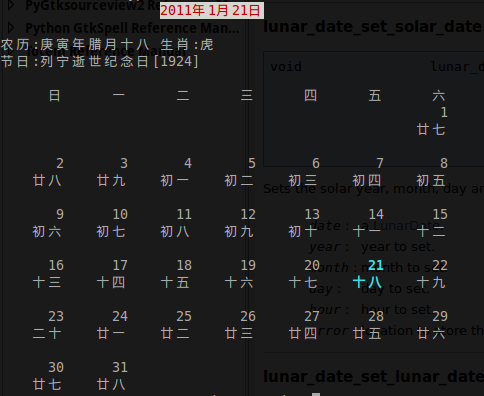逍遥云's Blog
努力做好自己!
一个查看阴历的小工具
接着上一篇liblunar的日历bug问题,这里写了一个查询月份的工具,代码比较简陋
1 2 3 4 5 6 7 8 9 10 11 12 13 14 15 16 17 18 19 20 21 22 23 24 25 26 27 28 29 30 31 32 33 34 35 36 37 38 39 40 41 42 43 44 45 46 47 48 49 50 51 52 53 54 55 56 57 58 59 60 61 62 63 64 65 66 67 68 69 70 71 72 73 74 75 76 77 78 79 80 81 82 83 84 85 86 87 88 89 90 91 92 93 94 95 96 97 98 99 100 101 102 103 104 105 106 107 108 109 110 111 112 113 114 115 116 117 118 119 120 121 122 123 124 125 126 127 128 129 130 131 132 133 134 135 136 137 138 139 140 141 142 143 144 145 146 147 148 149 150 151 152 153 154 155 | /* * author:pallover#gmail.com * website: http://pallove.is-programmer.com/ */#include <lunar/lunar.h>#include <stdio.h>#include <stdlib.h>#include <string.h>#include <time.h>int str2int(const char *str){ int n = 0; while(*str >= '0' && *str <= '9') { n = n * 10 + (*str - '0'); str++; } return n;}int get_weekday(int year, int month, int day){ int m = month; if(m == 1) { m = 13; year -= 1; } else if(m == 2) { m = 14; year -= 1; } int c = year / 100; int y = year % 100; int d = day; return (((c >> 2) - (c << 1) + y + (y >> 2) + (13 * (m + 1) / 5) + d - 1) % 7 + 7) % 7;}int get_mdays(int year, int month){ switch(month) { case 1: case 3: case 5: case 7: case 8: case 10: case 12: return 31; case 4: case 6: case 9: case 11: return 30; case 2: if(!(year % 4) && year % 100 || !(year % 400)) return 29; else return 28; }}int main(int argc, char *argv[]){ struct tm *tm_ptr; time_t the_time; (void) time(&the_time); tm_ptr = localtime(&the_time); int nyear = 0, nmonth = 1, nday = 1; if(argc > 1) { nyear = str2int(argv[1]); if(nyear <= 1900) nyear = tm_ptr->tm_year + 1900; if(argc > 2) { nmonth = str2int(argv[2]); if(nmonth < 1) nmonth = 1; if(argc > 3) { nday = str2int(argv[3]); if(nday < 1) nday = 1; } } } else { nyear = tm_ptr->tm_year + 1900; nmonth = tm_ptr->tm_mon + 1; nday = tm_ptr->tm_mday; printf("%d, %d, %d\n", nyear, nmonth, nday); } lunar_init(&argc, &argv); LunarDate *lunar_date = lunar_date_new(); lunar_date_set_solar_date(lunar_date, nyear, nmonth, nday, 1, NULL); gchar *str = lunar_date_strftime(lunar_date, "%(NIAN)年%(YUE)月%(RI) 生肖:%(shengxiao) \n节日:%(jieri)"); printf("\n%*s%s%d年%d月%d日%s\n\n", 20, "", "\033[47m\033[31m", nyear, nmonth, nday, "\033[0m"); printf("农历:%s\n\n", str); char *weekday = "日一二三四五六"; char ch[4]; while(*weekday){ strncpy(ch, weekday, 3); ch[3] = 0; weekday += 3; printf("%*s%2s", 6, "", ch); } int i = 1, line, nlen, n, firstwday, endline = 0; int nmdays = get_mdays(nyear, nmonth); firstwday = get_weekday(nyear, nmonth, 1); printf("\n"); line = 7 - firstwday; while(nmdays > 0) { if(line % 7 && !endline) printf("%*s", firstwday << 3, ""); for(nlen = 0; nlen < line; nlen++, i++) { n = get_weekday(nyear, nmonth, i); printf("%*s%s%2d%s", 6, "", ((i == nday) ? "\033[36m\033[1m" : ""), i, ((i == nday) ? "\033[0m" : "")); } i -= line; if(n == 6 || endline) { printf("\n"); } if(line % 7 && !endline) printf("%*s", firstwday << 3, ""); for(nlen = 0; nlen < line; nlen++, i++) { lunar_date_set_solar_date(lunar_date, nyear, nmonth, i, 0, NULL); printf("%*s%s%4s%s", 4, "", ((i == nday) ? "\033[36m\033[1m" : ""), lunar_date_strftime(lunar_date, "%(RI)"), ((i == nday) ? "\033[0m" : "")); } if(n == 6 || endline) { printf("\n\n"); } nmdays -= line; line = (nmdays >= 7) ? 7 : nmdays % 7, endline = 1; } lunar_date_free(lunar_date); exit(0);} |
可以传入0-3个自己想查询有效参数(年,月,日),如不输入,则默认为本地日期。
liblunar的调用节日的bug
1 2 3 4 5 6 7 8 9 10 11 12 13 14 15 16 17 18 19 20 21 22 23 24 25 26 27 28 29 30 31 32 33 34 35 | if (strstr(format, "%(jieri)") != NULL){ gchar bufs[128]; gchar *tmp; tmp = lunar_date_get_jieri(date, " "); if (*tmp) { g_utf8_strncpy(bufs, tmp, g_utf8_strlen(tmp, 128)); } /*if (strstr(tmp, " " ) != NULL) { char** buf = g_strsplit(tmp, " ", -1); if (g_utf8_validate(*buf, -1, NULL)) g_utf8_strncpy(bufs, *buf, 3); else { strncpy(bufs, *buf, 4); bufs[4]= '\0'; } g_strfreev(buf); } else { if (g_utf8_validate(tmp, -1, NULL)) g_utf8_strncpy(bufs, tmp, 3); else { strncpy(bufs, tmp, 4); bufs[4]= '\0'; } }*/ g_free(tmp); str = g_string_replace(str, "%(jieri)", bufs, -1);} |
好吧,本意是要拆分开然后再组在一起,却写的莫名其妙的,应该用循环也没用,就改了下。这下可以显示全了。
测试的代码为:
1 2 3 4 5 6 7 8 9 10 11 12 13 14 15 16 | #include <lunar/lunar.h>#include <stdio.h>#include <stdlib.h>int main(int argc, char *argv[]){ //g_type_init(); 这句我扔到lunar_init函数里面去了。 lunar_init(&argc, &argv); LunarDate *lunar_date = lunar_date_new(); lunar_date_set_solar_date(lunar_date, 2011, 10, 28, 1, NULL); gchar *str = lunar_date_strftime(lunar_date, "%(NIAN)年%(YUE)月%(RI)日%(SHI)时 生肖:%(shengxiao) 节日:%(jieri)"); printf("out str:%s", str); lunar_date_free(lunar_date); exit(0);} |
